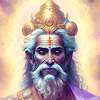
Brahma is one of the most important deities in Hinduism, the primary religion of India.
He is the god of creation, and is responsible for the creation of the universe and all that it contains.
He is believed to be the creator of the four Vedas, the sacred texts of Hinduism.
Moreover, he is one of the Trimurti, a triad of gods who are thought to control the cycle of creation, preservation, and destruction of the universe.
This time I will briefly introduce the characteristics of the creator god Brahma.
Who is Brahma?
Brahma is said to be the creator of the universe (planets, etc.) and various living beings (humans, animals, etc.).
He is also known as the creator of the Vedas.
Brahma is the third and most important member of the Trinity (Trimurti) after Vishnu and Shiva.
He has four faces, each pointing in four directions.
It is said that from each of his four mouths he spun four Vedas.
If you want to know about the Vedas, read this article.
What does "The Veda" meaning? A Brief Overview of the Ancient Hindu Texts
The Vedas are the collective term for a set of religious texts compiled in India, the oldest in the world. I tried to briefly summarize contents.
The myth about Brahma's wife
The consort of Brahma is said to be Saraswati.
She is a Hindu goddess who governs knowledge such as art and learning.
Brahma created Saraswati out of his own body.
However, he wanted to marry her because of her beauty.

Will you marry me?
Saraswati said

I can't get married...
And she ran away from Brahma.
Brahma created faces on his four sides to see Saraswati always.
Furthermore, when Brahma got the fifth face, Saraswati thought

I can't escape his marriage proposal...
Finally, Saraswati married Brahma and gave birth to Manu, the progenitor of mankind.
By the way, the fifth face would be cut off by Shiva later.
What does Brahma look like?
Brahma is usually depicted with four faces and four arms.
Each of the four faces is said to face north, south, east, and west, and in his hand is not a weapon, but something that symbolizes knowledge and creativity.
For example:
- Vedas
- Rosary (symbolizing time)
- Ladle used in ceremonies (tool for drawing water)
- A vessel of water (a symbol of all life)
Often depicted with a white beard, this symbolizes the experience and knowledge of the rishis (saints).
It may also depict the following:
- Sitting on lotus
- Wearing white clothes (or red or pink clothes)
- Riding Hamsa (divine bird and white goose) of Vahana

Post a Comment